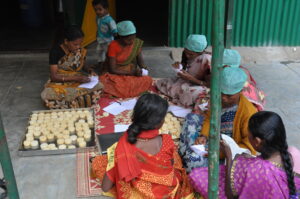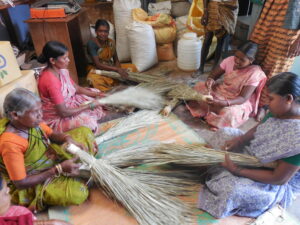Indigenous communities in the Nilgiri Biosphere Reserve area have organised themselves into a Farmer Producer Company to secure their livelihoods. The company’s significant growth in terms of membership and the business turnover reflects the success of the model in providing sustainable and fair livelihood options for the indigenous communities.
The indigenous communities of the Nilgiris Biosphere Reserve (NBR) cultivate coffee, pepper, silk cotton, millets, pulses, cereals, spices and fruits. They are also traditionally involved in collecting honey, amla, shikakai, soap nuts and berries, phoenix leaves, seasonally from the adjacent forest. The indigenous communities were struggling with issues of unfair pricing, market fluctuations, and exploitation by middlemen in the sale of their NTFP produce. Aadhimalai Pazhanagudiyinar Producer Company Limited (APPCL) emerged as a response to this, aiming to establish a system that ensures fair prices for their products, providing market stability and reducing vulnerability to price fluctuations.

Soap making by women members of FPO
The beginning
Keystone Foundation, the driving force behind Aadhimalai, initiated the process by setting up resource centers to add value to the products collected by the communities at the village level. In 2004-05 Area Resource Centres were set up across the Nilgiri Biosphere Reserve. This was based in a central village, with many satellite hamlets being serviced by it.
Over time, an important activity that these resource centres performed was related to production and value addition of NTFPs and farm produce. Activities promoted through livelihood interventions of Keystone, yielded organic and sustainably harvested products. Instead of selling it in the open market, intervention was made to value add and sell it locally. One of the important aspects that was stressed upon was to have community membership in these centres. This enabled produce from many families to be aggregated. A select number of people, mainly women, were trained for value addition.
Over time, the centres’ role got diversified and they started acting primarily as a production centre. They also served as
- a resource base for information and knowledge on forests, land, wildlife and water
- a place to acquire more skills and appropriate technologies
- a place for environment education and programmes for children
- a centre for health education for women and children
- a knowledge base on current laws and rights related to adivasis and forests
By 2013, all these units were federated and registered independently as a Producer Company. The production centres were registered under Aadhimalai Pazhangudiyinar Producer Company Limited.
Aadhimalai Pazhanagudiyinar Producer Company Limited (APPCL) is a company wholly owned by the indigenous communities, spread over 147 villages, one of the first of its kind at a national level. The producer collective was registered as Aadhimalai Pazhanagudiyinar Producer Company Limited on 3rd April 2013 under the Indian Companies Act of 1956. APPCL was incubated by Keystone Foundation (www.keystone-foundation.org) and initiated in 2013 to anchor livelihoods of indigenous communities by encouraging traditional organic food farming, handicrafts, livestock rearing, sustainable harvest of forest produce, conservation of natural resources, value addition etc., thereby securing the well-being of the communities and the landscape.
A core aspect of Aadhimalai’s vision was to bridge the gap between business management practices and the unique needs of marginalized indigenous communities. The enterprise focuses on quality, eco-friendliness, and fair pricing, aiming to eliminate exploitative trade practices by intermediaries. Aadhimalai currently has 1809 shareholders all of whom are members of the indigenous communities in the Nilgiri Biosphere Reserve. The table below shows the distribution of the shareholders across different regions.
Table 1: Distribution of Shareholders
| Area | Total Members | Men | Women |
| Konavakkarai | 223 | 108 | 115 |
| Arakode | 471 | 242 | 229 |
| Coonoor | 282 | 141 | 141 |
| Pillur | 182 | 79 | 103 |
| Sigur | 2 | 1 | 1 |
| Hasanur | 649 | 363 | 286 |
| Total | 1809 | 875 | 934 |
The formation of the FPO involved active participation from the indigenous community members. The democratic governance structure, with the Board of Directors elected by the community members, ensured that the FPO’s activities align with the interests and needs of the community, promoting a sense of ownership and inclusivity.
Key Benefits
Aadhimalai contributes significantly to the social and economic well-being of local communities through various initiatives. The key benefits include:
Aadhimalai procures key forest produce such as honey, beeswax, shikakai, amla, soapnuts, jamun, figs, and haritaki, as well as agricultural produce like coffee, kapok silk cotton, millets, and pepper. The organization ensures that community members receive higher prices for their produce compared to local traders. For instance, Aadhimalai pays Rs. 190 per kg for coffee, surpassing the Rs. 100–Rs. 110 range offered by local traders.
Aadhimalai employs electronic weighing machines to ensure accurate measurements and eliminate discrepancies. This practice helps community members become familiar with modern systems when dealing with traders.
It provides a market for NTFP products such as shikakai, beeswax, figs, haritaki, soapnuts, etc., which may not find buyers in local markets. Notably, Aadhimalai pays nearly double the market rate for certain products like honey. Recognizing the risks involved in honey gathering, Aadhimalai provides accident insurance coverage of Rs. 1 Lakh to honey gatherers. This coverage offers support to the members and their families.
Aadhimalai collaborates with the Keystone Foundation to provide training to community members on sustainable harvesting techniques for forest produce. This initiative is critical for maintaining and developing the local ecosystem.
Aadhimalai actively encourages farmers to adopt organic agriculture practices. The organization supports farmers in forming groups as part of the Participatory Guarantee System (PGS), fostering sustainable and organic farming practices.
Challenges and Triumphs
Aadhimalai faced numerous challenges in its initial stages. Establishing a viable market, managing a substantial supply of perishable items, dealing with pricing volatility, and building a strong brand identity were formidable hurdles. Limited accessibility to the villages poses a significant challenge, given the current inadequate connectivity infrastructure.
A crucial aspect of Aadhimalai’s operations is its procurement strategy, focusing on Particularly Vulnerable Tribal Group (PVTG) producers. The direct and fair relationship with these communities, reflected in premium pricing exceeding local market values, emphasizes Aadhimalai’s commitment to social equity and quality.
Aadhimalai’s emphasis on sustainability and organic practices is evident in its certification under the Participatory Guarantee System (PGS). The organization meticulously documents every stage of production, from planting to harvesting, aligning with its core values of organic integrity and sustainable harvesting.
Stringent quality checks are integral to Aadhimalai’s operations, conducted during procurement, production, and packing stages. This commitment to rigorous quality control ensures that every product leaving the facility meets the highest standards, safeguarding consumers and maintaining the integrity of Aadhimalai’s mission.

A group of women involved in broom making
Impact
Aadhimalai’s impact has grown significantly over time, starting with 15 members and expanding to 1809 shareholders. This growth reflects the success of the model in providing sustainable and fair livelihood options for the indigenous communities of the Nilgiris Biosphere.
Aadhimalai has successfully marketed its products to retailers and wholesalers across the country, showcasing substantial growth. The shareholder count has surged from 1609 to 1809 in 2023, reflecting exponential expansion. Notably, the company achieved a remarkable turnover of Rs. 1.2 Crore in the last fiscal year. Every year, the profit made by the company is being distributed back to the indigenous producers.
In the fiscal year 2022-23, Aadhimalai generated 5,115 productive working days for women and reached over 2,200 indigenous families across approximately 135 villages. In the same year, it distributed a bonus of Rs. 2.25 lakhs to community members who supplied their produce.
The organization’s commitment to community upliftment is further exemplified by its recognition with the prestigious Equator Prize in 2021 from UNDP.
The future of Aadhimalai is intricately linked to the sustenance of local communities. The organization is committed to forging partnerships with like-minded organizations dedicated to community upliftment. Emphasis will be placed on adopting organic and sustainable harvesting practices, and the company aims to bolster community capacities while fostering a spirit of autonomy.
Jestin Pauls
Aadhimalai Pazhangudiyinar Producer
Company Ltd,
41/111E, Groves Hill Road, Kotagiri 643217
E-mail: ceo@aadhimalai.in









